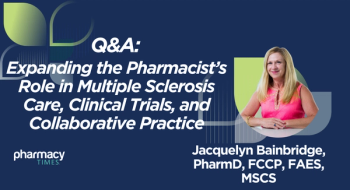
Expert: A Trauma-Informed Discussion for Pharmacist to Advance Health Equity
Tera Moore, PharmD, BCACP, discusses the principles of trauma-informed care, along with the physiologic response to trauma.
Pharmacy Times interviewed Tera Moore, PharmD, BCACP, National Program Manager, Clinical Practice Integration and Model Advancement U.S. Department of Veterans Affairs, on how trauma-informed care intersects with health equity. Moore discussed the connection among pain management and mental health care and how this related to a trauma informed awareness. Moore emphasized how critical it is to not only be aware of trauma, but how it impacts patients. Additionally, Moore discussed how to approach this population with compassion and understanding.
Pharmacy Times
Can you introduce yourself?
Tera Moore
I'm Tera Moore. I'm a National Program Manager with the Department Affairs Pharmacy Benefits Management, Clinical Pharmacy Practice office. I specifically work on clinical practice integration and model advancement within the CPPO office.
Pharmacy Times
What are the principles of trauma-informed care?
Moore
Trauma informed care considers both the importance of physical and also psychological responses to past experiences, and those are specifically to traumas. It's how the body responds, that contributes to the patient's medical conditions and also their symptoms. Trauma is often grouped into adverse childhood experiences, or little T events. And those little T events are examples such as identity-based discrimination, emotional abuse, bullying, or stigma. Or big T events, which we think about most commonly. Those are more related to physical or sexual assault, combat exposure. There is really a trauma informed awareness, and that lens is critical. It gives you the ability to individualize in a more compassionate and equitable approach to healthcare delivery. And it's developing that patient centric individual care plans.
Pharmacy Times
How can pharmacists and health-care providers incorporate trauma informed- care into their services to benefit patients?
Moore
I think this is all about awareness of the abundant occurrences of trauma in our society. And understanding how that trauma can contribute to the development of not only medical conditions but exacerbation of symptoms. Being sensitive to the patient's environment, and interactions with them, and actively incorporating the principles of trauma informed care into practice — and it's with that compassion. What's really concerning and very important for health care providers to know is how critical this adversely affects health equity, but also how it contributes to high rates of stigma, too. This really impacts the overall care that patients receive when you don't have that trauma informed. We really can't say enough how critical it is to not only be aware of trauma, but how this impacts patients, and how to approach this population with compassion and understanding. With the understanding that it's going to affect both their physical and psychological contributors to their health outcomes.
Pharmacy Times
How can understanding the physiologic response to trauma help health care providers connect pain management and mental health care?
Moore
So, the physiological response to trauma is a coping mechanism that happens within the body and it's without any of us thinking about it. This can lead to avoidance and strategies to manage real and perceived threats in a way that might seem unusual, or even harmful. One common development is addiction. That regulates the brain pathways to help with coping. Another reluctance to engage in health care, may be due to perception of stigma or have a mistrust. Patients with the trauma history have higher rates of both and intensity of pain, and depression. This is connected to the physiological response to trauma that they're experiencing. We understand that this is a complex topic to put it simply as we can, patients with a trauma history have higher rates of pain, mental health, and also addiction. [They] experience stigma and bias in health care, and that's just additive to the trauma they already have. So often there's this internal mistrust or reluctance to seek care. These facts really highlight the need for not only pharmacists, but other health care providers to better understand and imply that trauma informed care into practice.
Pharmacy Times
Is there anything you would like to add?
Moore
I'll just add that the pharmacy workforce in particular, the pharmacist practitioners really does have a role in compassionate trauma informed care, and we would encourage anyone to learn more about it.
Newsletter
Stay informed on drug updates, treatment guidelines, and pharmacy practice trends—subscribe to Pharmacy Times for weekly clinical insights.


























